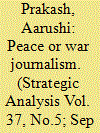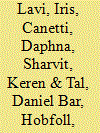|
|
|
Sort Order |
|
|
|
Items / Page
|
|
|
|
|
|
|
| Srl | Item |
| 1 |
ID:
123309


|
|
|
|
|
| Publication |
2013.
|
| Summary/Abstract |
Analysing peace journalism is a difficult task, especially within the context of an ongoing conflict. This study looks at peace journalism as it relates to the Balochistan/Pakistan conflict. Balochistan is a Pakistani province that makes up a large part of the country and is rich in natural resources. The Pakistani government has employed a policy of resource exploitation in the province, withholding any due share of profit from the Baloch. The conflict, which has been ongoing since the partition of India, has increasingly become a subject of debate in both the Pakistani and the international media, especially since the US Congress passed a non-binding resolution in favour of Balochistan's right to self-determination. This research study examines the extent of peace journalism in both the traditional and social media in Pakistan since the congressional resolution. The content analysis uses a sample of 100 articles drawn from four Pakistani newspapers, as well as 1,000 tweets from various relevant Twitter users. Using models derived from Galtung and built upon by Lynch and McGoldrick, this study reflects an apparent display of peace journalism in the working timeframe from various different sources.
|
|
|
|
|
|
|
|
|
|
|
|
|
|
|
|
| 2 |
ID:
128964


|
|
|
|
|
| Publication |
2014.
|
| Summary/Abstract |
Can endorsement of the ethos of conflict alter psychological effects of exposure to political violence? Israelis and Palestinians have been in a state of political and military turmoil for decades. We interviewed 781 Israelis and 1,196 Palestinians living in the West Bank, Gaza Strip, and East Jerusalem. Using structural equation modeling, we found that among those with a weak adherence to ethos of conflict, exposure predicted higher levels of hatred. For Israelis with a weak adherence to ethos of conflict, exposure predicted higher psychological distress and fear. For Palestinians with weaker adherence to ethos of conflict, stronger exposure predicted stronger threat perceptions. Israelis and Palestinians with a strong adherence to the ethos showed steady and high levels of negative emotions and threat, regardless of exposure. These results indicate that ethos of conflict is a double-edged sword that both protects and protracts the conflict. Although it serves as an engine fueling the conflict, it also plays a meaningful role as an empowering force for people suffering the psychological burden of an ongoing conflict.
|
|
|
|
|
|
|
|
|
|
|
|
|
|
|
|
|
|
|
|
|